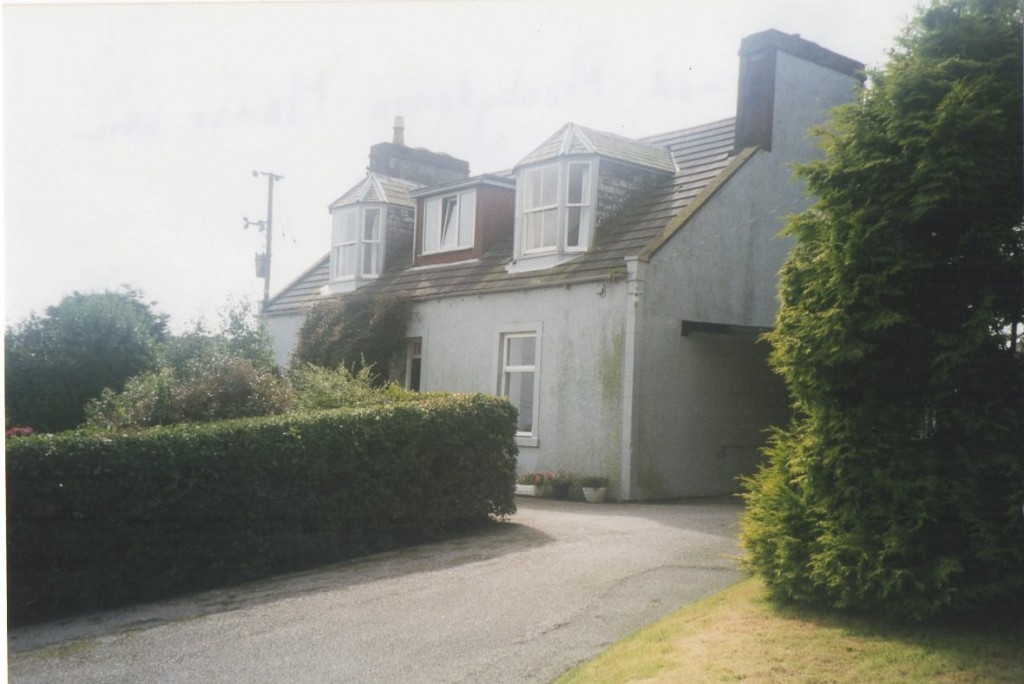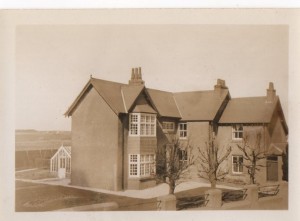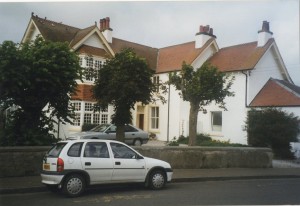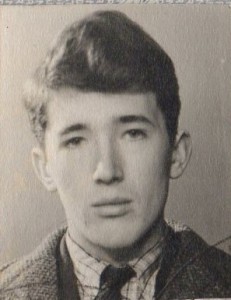RWPMW wrote the following account of his life towards the end of 2001. Towards the end of 2008, as he approached his eighty first birthday, he had another seven years to account for. His notes on this period are appended to the 2001 text which is more or less in its original form.
The full text of Peter’s autiobiography has been broken into several chapters. The flow through the original document is as follows
RWPMW – the early working years
From birth to the end of university.
I was born at home in the Reformed Presbyterian Manse in Whithorn, Wigtownshire, Scotland on 1927 December 15. My parents were Anna Elizabeth (née Macmorland b. 1897 Feb. 2, Straiton, Ayrshire, d. 1981 Oct. 14, Milngavie, Glasgow) and John Gairdner McWhirter (b. 1897 Dec 18, Ballantrae, Ayrshire, d. 1985 Nov. 27 Abingdon, Oxfordshire). My father was the local G.P. Within a month of birth I was showing signs of pyloric stenosis. On 1928 January 27 father and mother took me by car to Glasgow where in the evening I was operated on by Alex McLennan the surgeon whose theatre sister my mother used to be. My father’s diaries at this time tell of his worries about my state of health. Having noted on various days in January that I had been sick he writes on January 24; ‘Rather worried about Peter’s vomiting ?Stenosis of pylorus’. On the 26th he wrote; ‘In evening see little peristalic waves crossing Peter’s tummy which make me strongly suspect pylioric stenosis. Ring up Lilico (our family doctor) who comes down and he says “go to Glasgow”. Phone Alex McLennan and arrange it’. On the 27th; ‘ …leave for Glasgow with Girlie and Peter at 12:30. Get Mammie in Ballantrae and she comes too. Arrive at Alex McLennan’s at 6:30. He says “Pyloric spasms” and sends us to Leonard Finlay. He says “Operate at once”. Alex does so in St Georges Nursing Home at 9:30 and it’s all over in 15 mins’. On January 31 he reports; ‘Peter getting on nicely’. By February 3 my mother and I had move to Craigfad in Straiton to be with her parents and then home to Whithorn on February 5.
From the beginning I seem to have been called Peter although I was christened Robert William (after my two grandfathers) on February 26 by the minister of Whithorn – Arnold Reid the father of Leslie. In 1933 I started at the village school in Whithorn. My clearest memory of the house in which I was born is of climbing on one of the stones at the side of a memorial in the garden to a couple of ministers who had lived in the house and of it falling over on top of me. I clearly remember being surprised by how soft the earth felt as I was pressed into it. Father rushed out hearing my yells and pulled the stone off me. I was none the worse.
On 1998 September 1 Joy and I visited the house and were shown round by the lady now occupying it. We took a photograph of it – spoilt by a modern window set between the two original dormers in the roof. On 1933 December 29 we moved to Priory Croft – a much grander house, father remarks in his diary for that day “It is good to get away from the old hovel we’ve lived in since 1926 August 1 -7½ years now. We seem to have few regrets about leaving it”. Father paid £900 for Priory Croft. My most enduring memory of Priory Croft is of there being two maids who lived in and slept in the bedroom up the back stairs and of Mr McWilliam who came every day to pump up the water supply from a well to a tank in the roof, clean father’s car and help in the garden much of which was designed by my grandfather. The maids had to get up in the morning to light the range on which all the cooking was done – mostly by my mother. There was no electricity in the town till just before we left. I remember watching the electricians wiring our house and then starting myself to knock holes in the wall of the playroom just as they seemed to be doing. My parents were not too pleased! Father and mother had a very active social life with many parties and visits to our relations in Straiton and Ballantrae. My great friend of that period was Ian Drape whose father owned the local ironmongers shop. Many years later when I had turned 60 I visited him and discovered that he had spent all his life in Whithorn, had inherited his father’s shop and had risen to be Provost of the town. It was interesting to meet him again after so many years and I was particularly glad to have done so as he died the following year.
We lived in Priory Croft till 1936 August 6 when we moved to Edinburgh where father bought a bungalow called Shalimar in House o’Hill Gardens, Blackhall for which he paid £780. He had decided to give up as a general practitioner and train as a radiologist like his younger brother Robert who was Professor of Radiology at the University of Edinburgh. I went to school at Davidsons Mains Primary School and hated it. I must have been very unhappy for I remember my parents being concerned that I would burst into tears at the smallest problem. The teacher tried without success to beat me into learning to spell. She once took me to the front of the class that my younger sister Wendy was in and asked them to tell me how to spell some word. I still can’t spell! By 1937 April I was moved to George Herriot’s school which was a little better as far as I was concerned. It was an all boys school. My main memory was of one of the little buggers farting in the classroom and then pointing to me as if I had been responsible – very embarrassing for me and great amusement for the rest of the class. This was the time when I became interested in electricity and chemistry mainly I think because of my father who was studying electricity as part of his radiology course. He bought me a chemistry set made up by himself and an electricity set from a shop. I started the E C Club for electricity and chemistry and enrolled some of my friends – Ian Matheson in particular. His is about the only name I remember from that period. My happiest memories of this period are our holidays at Knockdon often with our neighbours the Binnies. With Hamish my cousin we spent long days making a dam across the River Girvan so that we could have a place to swim. We built a raft for the pool. On other days we helped with the hay making and with the sheep. These were very happy times and great memories.
After father had graduated with the DMR degree we moved to a flat at 167 Queen’s Drive, Glasgow on 1938 August 12 prior to his starting at the Victoria Infirmary there. I start at the High School on 1938 September 1. This was to be my final year in primary school. It was at this time that I met Deryck Dryburgh who was to remain a friend since. He and I travelled on the tram together to and from school. This was the time of Hitler and Munich. There were trenches being dug in Queen’s Park as shelters from bombing. In the early summer of 1939 I had appendicitis and missed the qualifying exam which had to be passed before starting secondary school. Father talked the authorities round to me continuing. In July 1939 we had a month’s holiday at Morar on the west coast of Scotland near Mallaig. That was a really great holiday. It was quite wet and we weren’t able to spend as much time on the beach as we would have liked but did a lot of walking. It is a lovely area.
War was declared on 1939 September 3 (our family was at Knockdon, my uncle’s farm in Ayrshire at the time). Wendy and I were evacuated to Troon, because of the fear of bombing in Glasgow, to start school at Marr College living, to begin with, with our Uncle Arthur and Aunt Jessie. By the end of the month my parents had bought a three bedroom semi-detached house at 55 Barassie Street, Troon and we all moved in. Father comments in his diary at this time “It’s only a year since we fitted up our flat with so much care and work and expense and now it’s all got to be undone.” I think father never recovered from the financial consequences of this coupled with the years training as a radiologist without salary or funding of any kind. In the event there was no bombing of any significance in our part of Glasgow. Early in February 1940 my Aunt Maisie and her daughter Fiona Anne came to stay in our house. Uncle Fred (Maisie’s husband) was living in Troon with his brother Arthur and sister-in-law Jessie at this time but soon went off to join the RAF. When he came home on leave he stayed with us at 55 Barrassie Street. They moved to a house of their own at the beginning of October. By the middle of November we had a couple of soldiers billeted on us – Geoffrey Langlands and Frank Whelan – members of the fourth commando unit who from time to time went off on raids on the European coast. I spent a lot of my time on chemistry and electricity – burning a hole in the carpet of my bedroom as the result of an accidental spill. Deryck Dryburgh used to spend time with me on our hobby. Later I found Charlie McAlister to have a similar interest in radio and, as he had an attic in his house, we moved all my wireless bits and pieces there. It was hard to acquire equipment in war time so we spent much time hunting through junk yards for discarded valves and other parts. My great aim was to build a three valve receiver. I learned a lot of radio theory at that time from such books as the Admiralty Handbooks of Wireless Telegraphy and from one of father’s textbooks from his radiology course. Marr College was a good school and I enjoyed being there. Father, against the advice of the head master, insisted that I shouldn’t waste my time learning Latin but instead do technical subjects. Whether this was a good decision or not I still don’t know for while I liked the technical subjects and have made a lot of use of what I learned there it did mean that I was not in the upper academic stream of the school. Maybe if I had done Latin I would have made better progress in French and would have had better teachers in English. French was a great problem for me as will appear later. One incident at school at this time stands out clearly in my memory. During break time one sunny day a group of us including Deryck Dryburgh were sitting in the grass surrounding the playground playing with a magnifying glass and managed to light a small fire of dry grass. This we kept going on a small scale until a gust of wind blew it into the nearby bush which instantly blazed into life. We tried to stop it but soon it was out of control. So we scattered. The teachers were soon on the scene and jumped into fire drill which entailed unrolling the fire hose and pointing it at the fire. There were so many leaks in this that there was hardly any water left to emerge from the nozzle. The whole school was by this time beating out the flames and soon had it out. To my horror I saw Deryck going up to the head master in front of the whole school presumably to admit to the crime. Later I had to do the same. Although we were threatened with it we were not expelled. In fact it had the benefit of showing just how inadequate the fire hoses were. One of our pleasures to pass the dreary hours of the French class was to collect insects at break time and have various competitions with them while our poor teacher, we called her Bella, tried to interest us in the irregular verbs. Soon the whole room was hopping with grasshoppers and fluttering with butterflies. She never seemed to notice. Maths was taught to us by a teacher we called Barney. The great game there was to gradually move our desks which were not fixed to the floor so that when he turned round from the blackboard he couldn’t find the one he wanted. Our classmate Jimmy McGeorge (Jumbo) was always in trouble with him often for no fault of his own. Because of this Barney had Jumbo sit right at the front of the class. Jumbo’s response was to sit looking up at him with an inane smile which drove poor Barney to further distraction. I remember once we filled Barney’s ink well – these were the days before ball-point pens – with bleach which destroyed his fountain pen. Who would be a teacher? One of the other things that occupied me at this time was the Army Cadet Force which is what became of the Scout Troop at the school. We were under the command of the games master called Charlie Cromar. One summer we had a marvellous camp at Straiton in the field next to the cemetery. We did a cross-country route march from Straiton to Knockdon, my uncle’s farm. Deryck and I were in front and were heading off till we were called back by Charlie C. He had decided that we should be going in a different direction and duly set off. By the time Deryck and I caught up they were well on their way. Soon he realised that something was wrong so he sent out scouts to try to discover where we were. Deryck and I climbed the hill on the right and were able to identify the Doon of Waterhead which I knew from having been at Knockdon – it is a very characteristic volcanic pipe. So we were able to get back on route and arrived at Knockdon. In fact if the rest of the troop had followed Deryck and me to begin with we would not have gone wrong. We bivouacked in the hay shed at Knockdon that night and cooked our own breakfast in the morning. I remember sneaking in to the farmhouse kitchen to get a bit extra from Aunt Nancy.
In the early summer of 1943 the family moved from Troon to 32 Lockerbie Road in Dumfries where father had been appointed to be radiologist at the Dumfries and Galloway Royal Infirmary. Wendy and I started at Dumfries Academy which I didn’t like. I remember the day my mother took me to be introduced to the headmaster. He asked to see the timetable for the classes I had attended at Marr College. This I had in a little notebook which had a hole in it burnt by focusing the sun on it by a magnifying glass – pyromaniac tendencies again. The head – a man called Lodge- suspected this was a burn caused by me smoking and said so. I denied it but he clearly thought otherwise. I didn’t smoke and took firmly against him for his lack of belief in my word. The only teachers that I liked were for science and maths – possibly because these were the subjects that I did best. At the end of term we were given a science project to do for a visit by parents. I chose to build a gas works having been impressed by a school visit to the local gas works. (Gas in those days was made from coal – it was before natural gas had been discovered under the North Sea.) The start was an iron retort packed with pieces of coal and heated by a set of Bunsen burners. From this gas was led through various purification processes to a gas chamber where it was collected. Finally there was a small flame where it was burnt. One day I was testing the system when there was a great explosion and the retort went one way and a glass tube the other. Fortunately no one was in the line of fire. My mistake was to use a rubber bung to seal the retort to the glass tube. With the heat the rubber melted and closed the tube with a resulting build up of pressure. It could have been a nasty accident. It says something for the teacher that having explained what I had got wrong he let me continue. In Dumfries I was in the Air Training Corps which wasn’t nearly such good fun as the Army Cadets although we did get a flight in an old Avro Anson over the Solway Firth. On another occasion I had a chance to fly in a sword fish biplane over the Firth of Clyde which was very exciting. Three of us cadets were squashed into the rear cockpit with the wind blowing through our hair while the pilot was in the front. While I was in Dumfries I reached the age of seventeen and a half when it was possible to volunteer for the services. One of my friends Hamish Macdonald had been called up to the Fleet Air Arm and came home with marvellous stories about life in the service. I wanted to do the same. I was given a medical and passed grade A1 all set to go. It was the time when the European war ended although the Japanese war continued. That week the authorities decided that they didn’t need to train any more pilots so the scheme was cancelled and I was offered the chance to be a stoker on a naval ship. Not what I had in mind so I decided to wait till I was called up in the usual way. At school I passed most of my exams but failed French which it was necessary to pass to get into university. Rather than go back to Dumfries Academy, for a repeat year, father thought it better if I returned to Troon. This I did and had a very happy year away from too strict parental control. It was at this time that I got to know Jimmy Wheelan who was in the same class. We had many happy walks along the sea front together. I managed to pass the French exam and there was a special announcement at morning assembly to say so – ‘The exam results are out today and you will get them when you attend the appropriate class during the day but McWhirter may like to know that he has passed lower French’. In addition I was top in Maths. It was a good year (1945-46). With the war over the government was selling off surplus radio equipment and I was able to buy some for next to nothing. I brought it back to Dumfries by train and taxi from the station. There was a lot and I was very excited by it all. I was now able to build more interesting things such as an oscilloscope and spent even more time in the attic working on such things.
In October 1946 I started at Glasgow University to study natural philosophy as it was called – physics. I stayed at the Maclay Hall of residence and met John Hawkins, Andrew Lindsay with both of whom I have kept in touch since. Jimmy Irvine and John H. shared a room with me. Jimmy died in 1994. My first year went well and I got a first class certificate in physics. In chemistry I had to take an oral but passed without trouble. In the second year I stayed in lodgings with Mrs Henderson, 24 Glasgow Street but I began to lose my way in physics maybe because I had found no problems in the first year and also because Professor Dee believed that exams were a waste of time so we were not put through any until the finals at the end of the fourth year when I did very badly – getting only a third class degree.
My extra second year subject was geology which I enjoyed – we had visits to various places to look for fossils and geological features and the exam was quite easy. During these years I saw a lot of Jimmy Wheelan and Andrew Lindsay and also Deryck Dryburgh who was in the navy at that time and came home to Glasgow on leave from time to time.





